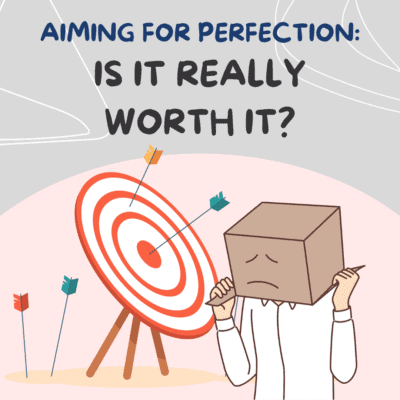In today’s fast-paced and highly competitive world, the pursuit of perfection often becomes the Holy Grail for many. Perfection represents the pinnacle of achievement – a state where everything aligns flawlessly with our expectations and standards. It’s a high standard that many of us, especially in school or work, try to reach. We often think that being perfect is the ultimate goal, whether it’s in our projects, sports, or even daily activities. The idea of perfection is appealing because it drives us to improve, compels us to refine our skills, and pushes us beyond our comfort zones. In professional settings, aiming for high standards can lead to exceptional quality of work and can set us apart in our fields.
The Hidden Costs
However, constantly aiming for perfection has its drawbacks. Aiming for flawlessness at all times can be incredibly stressful and overwhelming, particularly when it becomes a relentless endeavour. One of the most profound impacts of this pursuit is the toll it takes on mental health.
Individuals who constantly strive for perfection often experience increased levels of stress and anxiety. This is primarily because the bar they set for themselves is usually unattainably high, turning every task into a high-pressure situation. The fear of not meeting these standards can lead to a perpetual state of worry and unease. Over time, this sustained stress can escalate into more severe problems like chronic anxiety, which affects an individual’s overall well-being and can disrupt daily functioning.
Another psychological aspect tied to perfectionism is the cycle of self-doubt and fear of failure. Perfectionists often struggle with feelings of inadequacy and are overly critical of themselves. Even small mistakes or imperfections can seem like huge failures to them. This mindset can create a vicious cycle, where the fear of failure paralyzes them. As the stress continues, they begin to lose the interest or motivation that led them to take on a task in the first place. In extreme cases, this pursuit of perfection can also lead to avoidance behaviours, where individuals may choose not to engage in tasks where they fear they might not achieve perfection.
The Alternative: Excellence Over Perfection
Perhaps a more realistic and healthier goal is to strive for excellence rather than perfection. Excellence allows for imperfections and recognizes that mistakes are a natural part of the learning and growth process. For instance, mistakes can occur at any point when we solve math problems – be it in understanding the problem, applying a formula, or calculating the answer. These errors are not just missteps; they are opportunities for deeper understanding. Every mistake in a math problem is a chance to explore the ‘why’ and ‘how’ of the concept. It’s about doing the best you can with the resources available, and continuously striving to improve, without the unrealistic expectation of flawlessness.
The Value of Embracing Imperfections
Life is unpredictable and full of imperfections. By acknowledging and embracing these imperfections, we open ourselves to a richer, more authentic experience of life. Accepting life’s imperfections doesn’t mean settling for less; rather, it means recognizing the beauty and lessons hidden in the unexpected. This mindset shift allows us to appreciate our experiences more deeply, finding joy and learning in both triumphs and setbacks. It’s in the imperfect moments that we often discover our strengths, develop empathy, and learn the value of resilience.
In conclusion, while aiming for perfection can drive us to achieve great things, it’s important to recognize its potential downsides. Striving for excellence, on the other hand, offers a more sustainable and healthy approach. It encourages continuous improvement while accepting the inherent imperfections in all aspects of life. Ultimately, finding a balance that works for you, where you are challenged yet not overwhelmed, is key to a successful and satisfying life journey!
This article serves solely as advice and should not be considered a replacement for professional guidance. While these suggestions can be beneficial for many, individual experiences and needs may vary. If you or someone you know is struggling with severe anxiety or other mental health issues, it’s crucial to seek help from professional therapists or counsellors. They can provide specialized assistance tailored to individual needs.





